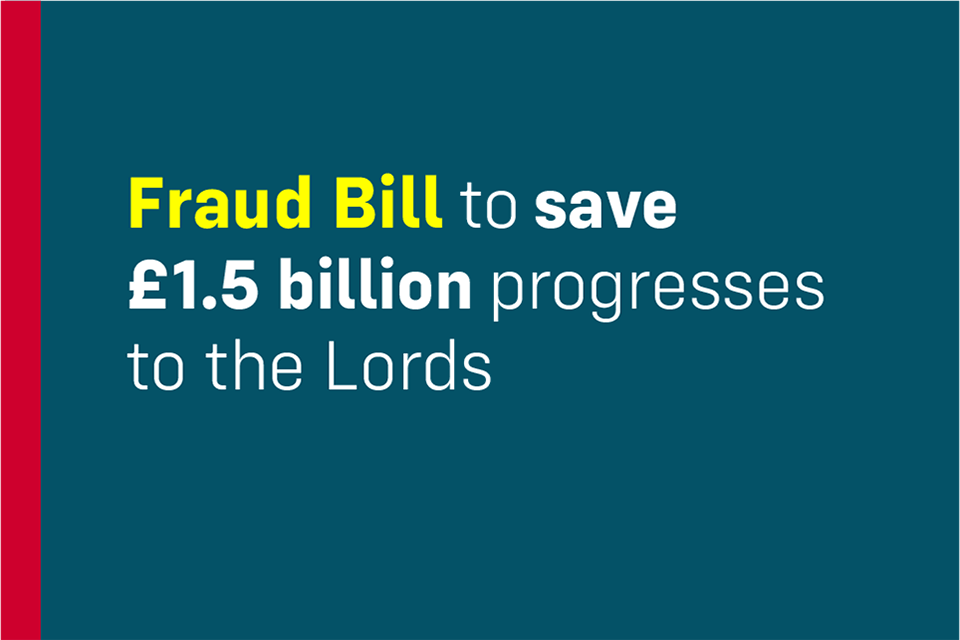
Fraud Bill to Save £1.5B Advances to Lords
Plans to recover stolen cash and impose driving bans on those who repeatedly fail to pay back taxpayer money moved a step closer today, as Ministers vowed “to address the unacceptable levels of fraud and error we’ve inherited”
-
The Public Authorities (Fraud, Error, and Recovery) Bill, set to save £1.5 billion over the next five years, progresses to the Lords
-
The Bill follows the biggest welfare fraud and error budget package in recent history
-
Changes could help boost investment in public services and protect the public purse, as part of the Plan for Change
New souped-up powers from the Department of Work and Pensions (DWP), which will allow DWP to recover money directly from the bank accounts of fraudsters who can repay but are wilfully gaming the system in order not to, passed an important stage in the House of Commons as it had its Third Reading.
The Public Authorities (Fraud, Error, and Recovery) Bill, which could put these measures into law, will help DWP to catch fraudsters, prevent overpayments and protect taxpayer’s money.
The Bill will save the taxpayer £1.5 billion over the next five years and is part of wider plans set out in the Autumn budget and Spring Statement to save £9.6 billion by 2030. This means taxpayer’s money can be invested in public services as part of the government’s Plan for Change.
Minister for Transformation, Andrew Western said:
Enhancing our powers is essential to fulfilling our commitment to the public, as they will enable us to address the unacceptable levels of fraud and error we’ve inherited and better protect public funds.
By strengthening our ability to catch criminals and prevent overpayments, we can keep up with the evolving nature of welfare fraud while reducing the risk of people falling further into debt, ensuring that more resources are directed towards improving the lives of people across the country.
The new legislation comes as the government is dealing with the broken welfare system it inherited, with out-of-control levels of fraud and error costing the taxpayer around £10 billion a year – with a total of £35 billion of taxpayers’ money incorrectly paid to those not entitled to the money since the pandemic.
The Bill will also give powers to the DWP to get data from banks and other financial institutions to help verify the eligibility of those who receive certain benefits to make sure they are getting the correct payments – this will help to stop people falling further into debt because of incorrect payments and help the DWP spot fraudulent claims.
No personal information will be shared by DWP to support financial institutions in the identification of these accounts, and DWP will not have access to people’s bank accounts in verifying eligibility and will not be able to see where people are spending their money.
Protections are central to the Bill, making sure there is proportionate and effective use of the powers, and that DWP is protecting vulnerable customers. For example, people will only be disqualified from driving as a last resort when they don’t rely on their car for work or for caring responsibilities and where they continually avoid repayment. Staff will be trained to the highest standards on the appropriate use of new powers, and we will introduce new oversight and reporting mechanisms.
On top of the Bill measures, the Chancellor announced in the Spring Statement a further commitment to recruit over 500 additional DWP fraud and error staff who will make better use of government data to correct errors in benefit claims, as well as increasing checks on potential Universal Credit claimants by introducing more ways to verify the amount of savings they hold, as well as their earnings and expenses.
The Cabinet Office’s Public Sector Fraud Authority will also be given more powers under the legislation, allowing the department’s investigators to detect and recover fraud in other departments and bodies across the public sector.
Minister in the Cabinet Office, Georgia Gould said:
This Bill will save taxpayers’ money. People are currently getting away with stealing vast sums of cash because our investigators don’t have the powers they need to detect and recover fraud across the public sector.
We’re giving our investigators new powers to tackle fraud wherever they find it – as well as doubling the time available to bring pandemic fraudsters to justice.
An additional new measure will see the time limit for civil claims against Covid fraud doubled from six to twelve years. This step change in the ability to fight fraud committed during the pandemic will give the Covid Corruption Commissioner and the Public Sector Fraud Authority more time to investigate complex cases and apply their new powers retrospectively – including the ability to raid properties and retrieve money from Covid fraudsters’ bank accounts.
The Bill measures will now progress to the House of Lords to be debated further.
Additional Information
- The Fraud, Error and Recovery Bill forms part of wider government plans to save a total of £8.6bn over 5 years in the biggest welfare fraud and error budget package in recent history.
- Since the pandemic, a total of £35 billion of taxpayers’ money has been incorrectly paid to those not entitled to DWP benefits.
https://www.gov.uk/government/news/fraud-bill-to-save-15-billion-progresses-to-the-lords

